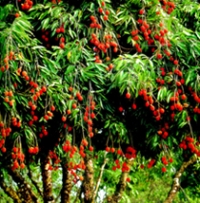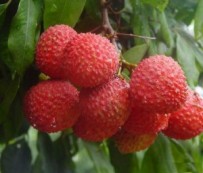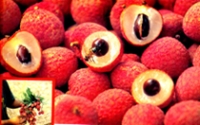Tags
food, health, health benefits of litchi, litchi, litchi chinensis, litchi nutritive analysis, medicine, side effects of litchi
Litchi, a delicious and juicy fruit arrives in summer. Its botanical name is Litchi chinensis and it belongs to the family of Sapindaceae.
The native place of litchi is in sub-tropical regions of Southern China, fruit is considered the symbol of love and romance in China and also available in nearby areas like southern Taiwan, northern Vietnam, Indonesia, the Philippines, Japan, Queensland, Madagascar, Brazil, South Africa, Pakistan, Bangladesh, Burma and Australia.
 In India, the prime producing area of litchi is the Muzaffarpur in Bihar having various varieties of Litchi. Bihar is the leading state in litchi production, followed by West Bengal, and Assam.
In India, the prime producing area of litchi is the Muzaffarpur in Bihar having various varieties of Litchi. Bihar is the leading state in litchi production, followed by West Bengal, and Assam.
Litchis are commonly sold fresh in Asian markets, and in recent years, also widely in supermarkets worldwide. The red rind turns dark brown when the fruit is refrigerated, but the taste is not affected. It is also sold canned year-round. The fruit can be dried with the rind intact, at which point the flesh shrinks and darkens. Dried litchis are often called litchi nuts, though, of course, they are not a real nut. Litchis are also used in making juices and various other dishes.
The demand for the litchi fruit is high, but supply is very limited due to its highly perishable nature. This becomes a bottleneck in litchi trade. Now, the Bhabha Atomic Research Centre (BARC) has developed a technology which considerably increases the shelf life of litchi, for upto a month or more.
|
See the table below for in depth analysis of nutrients: |
||
|
Principle |
Nutrient Value |
Percentage of RDA |
| Energy | 66 kcal | 3.3% |
| Carbohydrates | 16.53 g | 12.7% |
| Protein | 0.83 g | 1.5% |
| Total Fat | 0.44 g | 2% |
| Cholesterol | 0 mg | 0% |
| Dietary Fiber | 1.3 g | 3.5% |
| Folates | 14 µg | 3.5% |
| Niacin | 0.603 mg | 3.5% |
| Choline | 7.1 mg | 1% |
| Pyridoxine | 0.100 mg | 9% |
| Riboflavin | 0.065 mg | 5% |
| Thiamin | 0.011 mg | 1% |
| Vitamin C | 71.5 mg | 119% |
| Vitamin E | 0.07 mg | 0.5% |
| Vitamin K | 0.4 µg | 0.3% |
|
Electrolytes |
||
| Sodium | 1 mg | 0% |
| Potassium | 171 mg | 3.5% |
| Calcium | 5 mg | 0.5% |
| Copper | 0.148 mg | 16% |
| Iron | 0.31 mg | 4% |
| Magnesium | 10 mg | 2.5% |
| Manganese | 0.055 mg | 2.5% |
| Phosphorus | 31 mg | 4.5% |
| Selenium | 0.6 µg | 1% |
| Zinc | 0.07 mg | 0.5% |
HEALTH BENEFITS:
- The fruit is low in calories and rich in dietary fibers, so it is very good choice for weight conscious individuals.

- Research studies suggest that oligonol , a low molecular weight polyphenol found abundantly in litchi fruit. Oligonol has been found to have several anti-oxidant, anti-influenza virus actions.
- In addition, it helps improve blood flow in organs, reduce weight, and protect skin from harmful UV rays.
- Litchis enhance the energy of the body.
- This fruit boosts the feeling of well-being of a person.
- Litchi is also rich in beta carotene which is more than the amount of beta carotene present in carrots.
- Litchi, like citrus fruits, is an excellent source of vitamin C; 100 g fresh fruits provide 71.5 mg or 119% of daily-recommended value. Studies suggest that consumption of fruits rich in vitamin C helps body develop resistance against infectious agents and scavenge harmful, pro-inflammatory free radicals.
- Vitamin C is also essential to the production of collagen, a well-functioning immune system and healthy teeth and bones.
- It is an antioxidant, helping rid the body of free radicals that contribute to disease and aging.
- Litchi also contains a very good amount of minerals like calcium, phosphorus, zinc, selenium, potassium and copper.
- Potassium is an important component of cell and body fluids help control heart rate and blood pressure; thus offers protection against stroke and coronary heart diseases.
- In 1 cup of fresh litchi, or 1 oz. of dried, you get about 300 mg of potassium, more than in a small orange. Potassium is an essential mineral that helps regulate heart rhythms. It is also an electrolyte which helps muscle contraction and fluid balance.
- Copper is required in the production of red blood cells.
- Litchi is also a source of magnesium and phosphorus, to support strong bones.
- Fresh litchi is also a source of B vitamins, specifically riboflavin, niacin, vitamin B-6 and folate. These vitamins are important to red blood cell health and metabolic processes.
- Litchi consists of unsaturated fatty acids that aid in the absorbing beta carotene and various other fat soluble vitamins.
- It aids in preventing blood clots, serious damage to the cells and also minimizes strokes to 50% in heart attack patients.
- The litchi is said to relieve coughing.
- It has beneficial effect on gastralgia, tumors and enlargements of the glands.
- Litchi contains 66% glucose,5% sucrose,total sugar content is more than 70%, ranks first in a variety of fruit,has effect on supply energy, add nutrition.
- As the researches show, litchi has effect on brain tissue, obviously improve agrypnia, amnesia,tired.
- The flesh of lychee helps overcome stomach upsets and stomach ulcers
- Litchi tonifying spleen, can calm the adverse-rising energy, it is the dietary supplements for intractable hiccups and diarrhea.
- Litchi has effect on tonifying kidney and strong sperm, improving liver function, accelerating the toxin exclusion, keep your skin soft. Suitable for dry skin.
- Other than medicinal use, Chinese people enjoy using the dried flesh in their tea as a sweetener in place of sugar
- The juice also contains bioflavonoids, including red anthocynanin and ellagic acids, substances that may help prevent some cancers
- It is an ideal juice for weak vision and blood-shot eyes when taken internally.
SIDE EFFECTS
- According to Chinese doctors, over-consumption may cause hypoglycemia leading to fever, seizure and unconsciousness.

- Western doctors believe that litchis can only be dangerous in excess if the subject is allergic to litchis, which may cause fall in blood pressure, gastrointestinal upset, respiratory distress, skin edema, dizziness and unconsciousness.
- Both Eastern and Western medical professionals agree that diabetics are at an increased risk when over-eating litchis due to their high sugar levels, and should avoid eating more than six or seven litchis at a time.
- Litchis are considered a “hot” food in Chinese culture. Eating too many “hot” foods is said to throw off the balance of the human body, belief that too many can cause bloody nose, sore throat and sores in the mouth.
